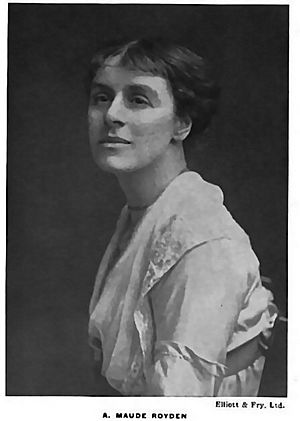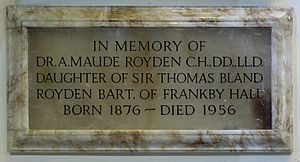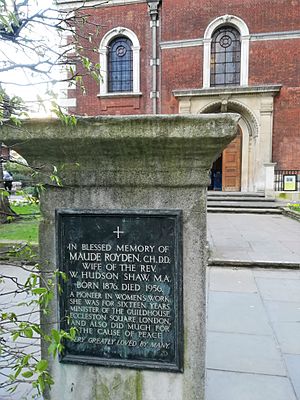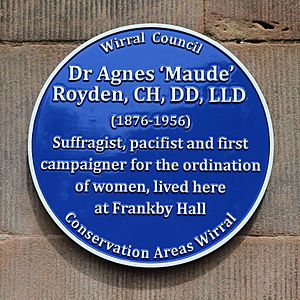Maude Royden facts for kids
Quick facts for kids
Maude Royden
|
|
|---|---|
 |
|
| Born |
Agnes Maude Royden
23 November 1876 Liverpool, England
|
| Died | 30 July 1956 (aged 79) London, England
|
| Other names | Maude Royden-Shaw |
| Alma mater | Lady Margaret Hall, Oxford |
| Occupation |
|
| Spouse(s) |
Hudson Shaw
(m. 1944) |
Agnes Maude Royden (born November 23, 1876 – died July 30, 1956), also known as Maude Royden-Shaw, was an important English woman. She was a preacher, a suffragist, and a strong supporter of women being allowed to become priests.
Contents
Early Life and Education
Maude Royden was born in Mossley Hill, Liverpool. She was the youngest daughter of a shipowner named Sir Thomas Bland Royden. She grew up in a large family home called Frankby Hall in Wirral.
School and University
Maude went to Cheltenham Ladies' College for her schooling. Later, she studied History at Lady Margaret Hall, Oxford University. While at Oxford, she became good friends with Kathleen Courtney, who also fought for women's right to vote. This friendship lasted their whole lives.
Her Work and Campaigns
After university, Maude worked for three years at a place called the Victoria Women's Settlement in Liverpool. This was a community center that helped people. She then worked as a parish assistant in a country church.
Fighting for Women's Rights
Maude gave talks about English literature to people who wanted to learn more. In 1909, she joined the main committee of the National Union of Women's Suffrage Societies (NUWSS). This group worked to get women the right to vote. From 1912 to 1914, she was the editor of their newspaper, The Common Cause. She also worked with the Church League for Women's Suffrage.
In 1913, she was asked to speak to a group of church leaders about important social issues.
Peace and the Church
Maude disagreed with the NUWSS when they supported the war effort during World War I. She was one of many people who signed the Open Christmas Letter in 1914, which called for peace. She became a leader in the Fellowship of Reconciliation, a group of Christians who believed in peace.
She became a vice-president of the Women's International League for Peace and Freedom. This group was started by women who wanted to stop wars.
Maude became very well known for her speeches about social and religious topics. In 1917, she became an assistant preacher at the City Temple in London. This was a big step because she was the first woman to hold such a position there.
Women in the Church
After World War I, Maude became very interested in helping women have a bigger role in the Church. In 1920, she preached in both French and English at St Pierre Cathedral in Geneva.
Maude traveled around the world, giving speeches and sermons from the 1920s to the 1940s. In 1929, she started a group called the Society for the Ministry of Women. This group worked to allow women to become ordained priests in the Church.
In 1930, Maude was given a very special award called the Order of the Companions of Honour. This award is given to people who have done great things for their country. She and her older brother, Thomas, are the only brother and sister to have both received this award.
University Honors
In 1931, Glasgow University gave Maude an honorary degree called Doctor of Divinity. She was the first woman in Britain to receive this honor. Later, in 1935, she received another honorary degree from the University of Liverpool.
Maude first joined a group that believed in peace, but later she changed her mind. She felt that Nazism was a greater evil than war itself.
Personal Life
On October 2, 1944, Maude married Hudson Shaw. She had loved him for over 40 years. He was 85 years old when they married and passed away a few months later. In her book A Threefold Cord, she wrote about their deep love.
After World War II, it was found that Maude Royden's name was on a list called 'The Black Book'. This was a secret list of British people the Nazis planned to arrest if they invaded Britain.
Maude Royden passed away on July 30, 1956, at her home in Hampstead, London.
Legacy
Maude Royden's work had a lasting impact.


Her name and picture are on the base of the statue of Millicent Fawcett in Parliament Square, London. This statue honors women who fought for the right to vote. It was unveiled in 2018.
In June 2019, a blue plaque was placed at her childhood home, Frankby Hall. Blue plaques are put on buildings to show that a famous person lived or worked there.

You can find many of Maude Royden's papers at The Women's Library in London.
Books by Maude Royden
- Downward paths (1916)
- Women and the sovereign state (1917)
- Prayer as a force (1923)
- Beauty in Religion (1923)
- Christ triumphant (1924)
- Church and woman (1924)
- Life's little pitfalls (1925)
- Here--and hereafter (1933)
- Problem of Palestine (1939)
- I Believe in God (1927)
- Women's Partnership in the New World (1941)
- A Threefold Cord (1947), her autobiography
 | Stephanie Wilson |
 | Charles Bolden |
 | Ronald McNair |
 | Frederick D. Gregory |

